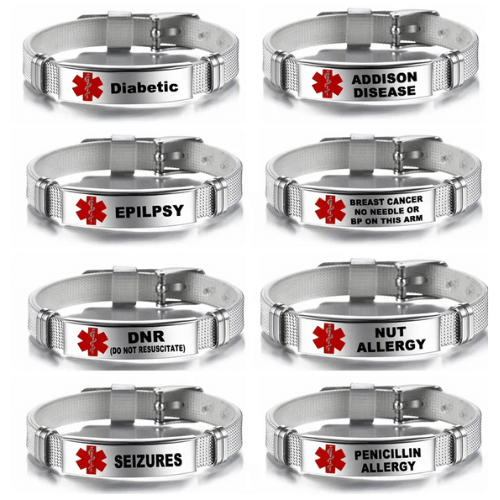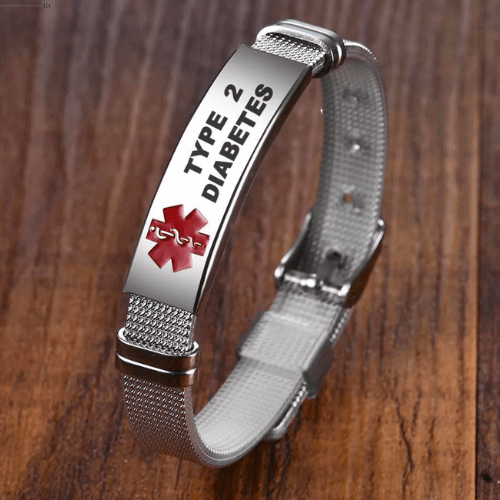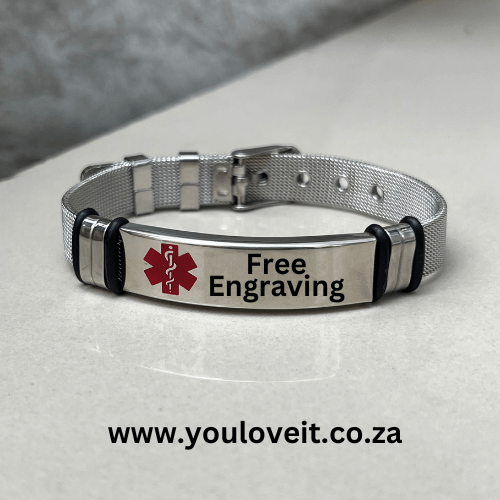Description
“DNR” stands for “Do Not Resuscitate,” and when included on a medical bracelet, it conveys a specific end-of-life medical directive. A Do Not Resuscitate order is a legal document that indicates a person’s preference to forego certain life-saving measures in the event of cardiac or respiratory arrest.
Addison’s disease, also known as adrenal insufficiency, is a chronic disorder that occurs when the adrenal glands do not produce enough hormones. The adrenal glands, which sit on top of each kidney, are responsible for producing essential hormones, including cortisol and aldosterone, which regulate various bodily functions. Including information about a nut allergy on an In Case of Emergency (ICE) bracelet is crucial for individuals with this allergy. An ICE bracelet provides quick and visible information to emergency responders and healthcare providers about specific health conditions, allergies, or other critical details.
Here’s why including a nut allergy on an ICE bracelet is important:
- Immediate Identification:
- In an emergency, when swift medical intervention is necessary, an ICE bracelet with information about a nut allergy allows healthcare professionals to immediately identify and respond to the allergy.
- Allergy Severity:
- The bracelet can indicate the severity of the nut allergy, whether it is mild, moderate, or severe. This information helps healthcare providers determine the appropriate level.
However, in the event of a seizure, an ICE bracelet allows first responders and healthcare providers to quickly identify the individual’s condition and understand that the episode may be related to a seizure disorder. Knowledge of a seizure disorder enables emergency responders to follow appropriate protocols for managing seizures. This includes ensuring a safe environment, protecting the individual from injury, and providing necessary medical attention. If the person is taking specific medications to manage seizures, this information can be included on the ICE bracelet. Knowing the type and dosage of antiepileptic medications can guide healthcare providers in emergency situations.
Epilepsy is a neurological disorder characterized by recurrent, unprovoked seizures. Seizures result from abnormal electrical activity in the brain, leading to temporary disruption of normal brain function. Epilepsy can affect people of all ages and backgrounds, and the frequency and severity of seizures can vary widely among individuals.
Wearing an In Case of Emergency (ICE) bracelet for breast cancer can offer several benefits, providing crucial information to healthcare providers in case of emergencies.
Here are the top three benefits:
- Rapid Access to Medical Information:
- In emergency situations, time is of the essence. A breast cancer ICE bracelet allows emergency responders and healthcare providers immediate access to critical medical information related to the individual’s breast cancer diagnosis, treatment plan, and any specific considerations or precautions needed. This quick access can significantly impact the timeliness and appropriateness of medical care.
- Enhanced Communication During Unconsciousness or Distress:
- In situations where the individual may be unconscious or unable to communicate effectively, the ICE bracelet serves as a silent communicator. It provides vital details about the breast cancer diagnosis, ongoing treatments, and other pertinent medical information, enabling healthcare providers to make informed decisions about care even when the patient cannot verbally convey their situation.
- Improved Coordination of Care:
- A breast cancer ICE bracelet helps ensure seamless coordination of care between emergency responders and the individual’s oncology team. Information about ongoing treatments, medications, or implanted devices can guide emergency medical personnel in providing appropriate care and alert them to potential complications or interactions related to breast cancer therapies.
Here are some notable medical facilities in Durban:
Firstly, Netcare St. Augustine’s Hospital: A prominent private hospital in Durban, Netcare St. Augustine’s Hospital offers a comprehensive range of medical services, including specialized units for cardiac care, oncology, and maternity services.
Durban North Medical Centre: This medical center provides a variety of healthcare services, including general practitioners, specialists, and diagnostic facilities. It serves the community in Durban North.
Inkosi Albert Luthuli Central Hospital: As a major government-funded hospital, Inkosi Albert Luthuli Central Hospital is one of the largest and most specialized hospitals in Durban. In addition, it is a tertiary care facility offering a wide range of medical services and specialties.
Life Entabeni Hospital: Life Entabeni Hospital is a private hospital that provides various medical services, including surgery, maternity care, and general medical services.
Lastly, Addington Hospital: Addington Hospital is a government-funded hospital that offers a range of medical services to the community, including emergency care, surgery, and outpatient services.









